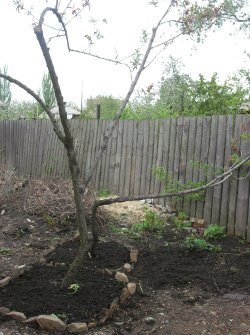Category: "Plants"
Огород
The word огород means a chunk of land near your house where you grow vegetables, in other words a vegetable garden, although in English we usually just say garden. It might also have berries and apples, but it's essential to have either vegetables or greens. It's a perfectly regular 1st declension noun.
| Sg | Pl | |
| Nom | огород | огороды |
| Acc | ||
| Gen | огорода | огородов |
| Pre | огороде | огородах |
| Dat | огороду | огородам |
| Ins | огородом | огородами |
Omigosh, but the Russians love their gardens. If they have a дача, then in the summer months they get out of town and raise as much food as they possibly can. If you'd like to see some pictures of a real Russian garden, take a look here.
| — Где Даня? — Он поливает огород. |
“Where is Danny?” “He is watering the garden.” |
| Флюра привезла мне огурцы и кабачки из своего огорода. | Flura brought me cucumbers and squash from her garden. |
| За нашим огородом есть речка, на которую мы ходим ловить рыбу. | Behind our garden is a stream where we go fishing. |
| — Что ты делал сегодня утром? — Я полол сорняки в огороде. |
“What did you do this morning?” “I pulled weeds in the garden.” |
Всходы
Всходы is a fun little word. The prefix вс- means upward. The root ход- means go. When you put them together into a word that is only used in the plural, it means sprouts, i.e. the tiny little beginnings of plants that have just come up out of the soil. Here's a sample sentence:
| Всходы выдерживают заморозки от минус 3 до минус 6 градусов. (source) | The sprouts can stand freezing weather from minus three to minus six degrees. |
Under the influence of books like “In Defense of Food: An Eater's Manifesto” by Michael Pollan and “Animal, Vegetable, Miracle: A Year of Food Life” by Barbara Kingsolver, I decided to do some container gardening on my patio. I went to the farmer's market and bought some Green Zebra tomatoes. I liked them so much that I squeezed out some seeds, fermented them and planted them:
| Вот помидорные всходы, которые в конце апреля появились у меня во дворе. | Here are the tomato sprouts that appeared in my yard at the end of April. |

Перекати-поле

Growing up in Arizona, every time the wind blew I would see tumbleweeds. In American movies they are a symbol of the vast and empty West, or sometimes of economic desolation in the country. Despite their association with the American West, they originally came from Russia, and their Russian name is перекати-поле, which means “roll across a field.” The phrase is treated as a neuter noun and requires neuter adjectives and verb agreement.
| По степи, вдоль и поперёк, спотыкаясь и прыгая, побежали перекати-поле, а одно из них попало в вихрь, завертелось, как птица, полетело к небу и, обротившись там в чёрную точку, исчезло из виду. (Чехов) | The tumbleweeds ran over the steppe, back and forth, bumping and jumping; and one of them ended up in a dust devil. It began to spin around, flew up into the sky like a bird, and there it turned into a black spot and vanished from view. |
| После бури на дворе обнаружилось одно перекати-поле, в середине которого зацепилась жалкая высохшая птица, наверно когда-то искавшая там убежище от неприятной погоды и не знавшая, что там она найдёт только колючую смерть. | After the storm in the middle of the yard we found a single tumbleweed, in the middle of which a pathetic, dried-up bird was stuck. It had probably sought refuge there from bad weather, not knowing that there it would only find a thorny death. |
In Russian перекати-поле is often used to describe a person who doesn't stay in one place very long. It's mostly a negative description since most Russians tend to be born, live, and die in the same area. Notice that when applied to a person, it takes masculine or feminine adjectives, depending on the gender of the person in question:
| За послендие пять лет мой внук Вовка жил и в Архангельске и Нововсибирске и на Камчатке. Он такой перекати-поле, бедняжка, боюсь, что он никогда не женится. | Over the last five years my grandson Vovka has lived in Arkhangelsk and Novovisbirsk and Kamchatka. He is such a rolling stone, the poor guy, that I'm he will never get married. |
| Я вообще такая перекати-поле… вечно езжу куда-нибудь, терпеть не могу сидеть на одном месте. (source) | I am such a rolling stone... constantly traveling somewhere. I can't standing staying in one place. |
Приствольные круги

Every once in a while it's simply a great joy to know an incredibly obscure piece of Russian vocabulary. The wife of one professor of Russian I know prides herself on knowing the Russian phrase for werewolf. (There are quite a few shape-shifters in Russian folklore.) So imagine my geekoid linguistic pleasure when the other day I ran across the phrase that means the circle of bricks or rocks that lie on the ground encircling the trunk of a tree. Such a circle is called приствольный круг. Heck, I don't even know what that is called in English.
I wish I could say that the phrase was connected with some exotic folk tale where Баба Яга the boney-legged witch captured a streamful of русалки mermaids and forced them to dance around a tree until they turned into stone, but in fact it is much more straight-forward than that. The root ствол means the trunk of a tree or bush. The prefix при- means nearby. Круг simply means circle. Thus пристволный круг means “a circle near a trunk.”